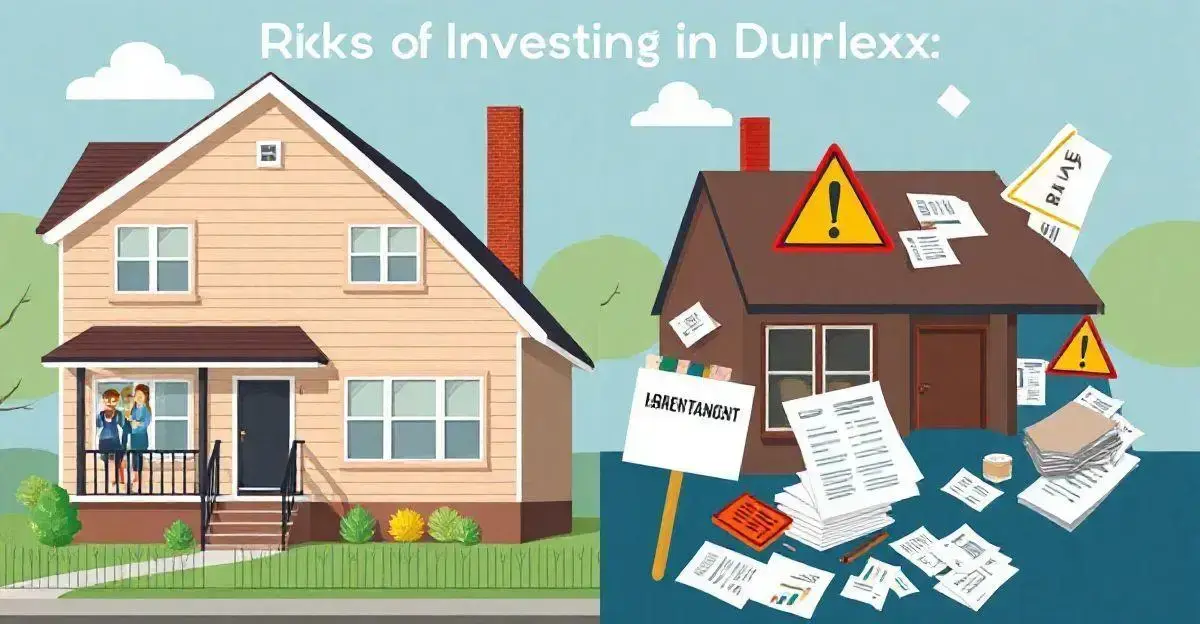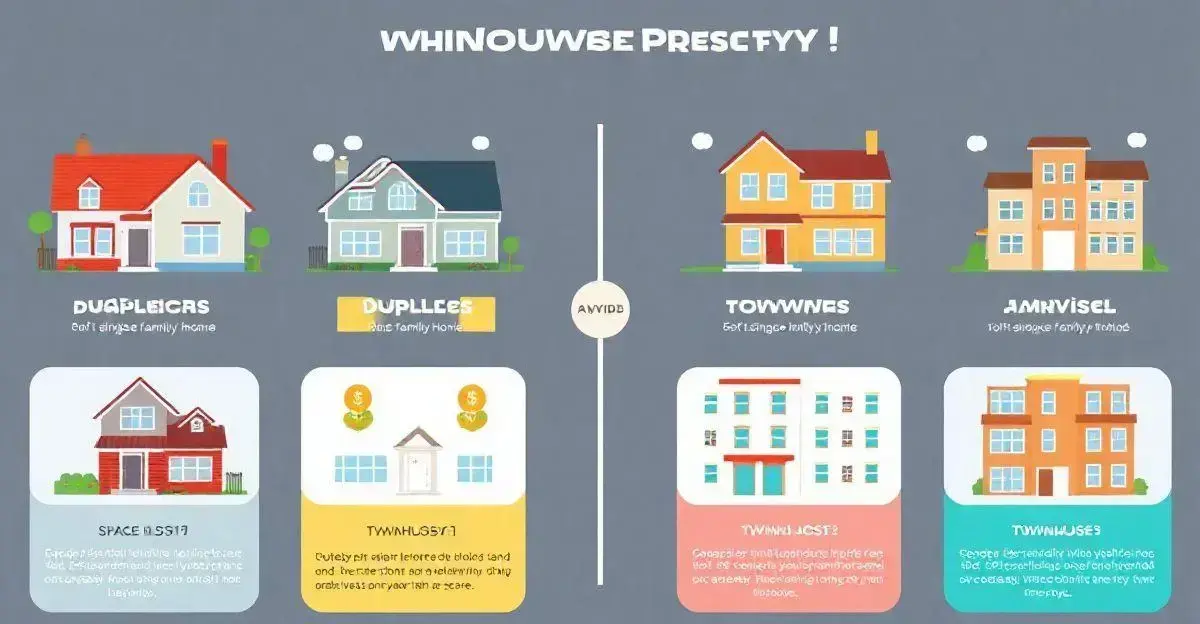Are duplexes a good investment? This question often arises for those exploring real estate opportunities. With two units in one building, duplexes present unique advantages and challenges that can attract both new and seasoned investors.
One key benefit of duplexes is their ability to generate rental income, which can help cover mortgage payments and provide positive cash flow. Additionally, the option for “house hacking” — living in one unit while renting out the other — makes this choice even more appealing for cost-conscious buyers.
If you’re considering a duplex investment, understanding the market trends and financial aspects is crucial. Read on to find out if a duplex is the right fit for your investment strategy!
Understanding Duplexes as an Investment
Understanding duplexes as an investment opportunity is crucial for potential property owners. A duplex is a residence that contains two separate living units, each with its own entrances. Many wonder, are duplexes a good investment?
This type of property can offer unique financial advantages, such as generating rental income from both units, which can significantly offset mortgage payments. Investors often find duplexes appealing due to their potential for long-term value appreciation in desirable neighborhoods.
Furthermore, duplexes provide an excellent option for house hacking, where owners can live in one unit while renting out the other. This strategy not only reduces living costs but also helps build equity over time.
With the demand for rental properties remaining strong, many are asking, are duplexes a good investment? They can be a great choice in various real estate markets.
Investors should also consider the tax benefits associated with owning a duplex. Property owners may be able to deduct certain expenses, such as repairs and property taxes, which can enhance overall profitability.
Additionally, duplexes are often more affordable than purchasing two separate properties, making them a strategically sound investment.
It’s important to assess local market conditions, rental rates, and property management responsibilities before making a purchase. By fully understanding the benefits and challenges, you can make an informed decision about whether a duplex investment aligns with your financial goals.
Financial Benefits of Duplex Ownership

The financial benefits of duplex ownership can be significant, making it an appealing investment option. Many potential investors often ask, are duplexes a good investment? One of the primary advantages is the potential to earn rental income from both units.
This dual income stream can help cover mortgage payments and contribute to a positive cash flow.
Moreover, owning a duplex allows investors to take advantage of house hacking. By living in one unit while renting out the other, homeowners can effectively reduce their living expenses and build equity over time. This strategy offers a practical way for first-time investors to enter the real estate market.
In addition to cash flow benefits, duplexes often appreciate in value over the long term. As neighborhoods develop and demand for rental properties increases, the value of a duplex can rise significantly, providing a solid return on investment.
For those wondering, are duplexes a good investment? The answer often lies in their potential for appreciation.
Tax benefits also play a crucial role in the financial equation. Duplex owners can deduct certain expenses on their taxes, such as mortgage interest, property taxes, and repair costs. These deductions can improve the overall profitability of the investment.
Finally, duplexes can be more affordable than investing in two separate properties. This affordability makes it easier for investors to enter the market and diversifies their real estate portfolio.
Market Trends for Duplex Investments
Market trends for duplex investments show a growing interest in multi-family properties among investors. As urban areas expand, demand for rental units continues to rise.
Many potential buyers often wonder, are duplexes a good investment? Duplexes, in particular, are popular choices for many reasons. They often offer affordability, allowing first-time buyers to enter the real estate market without breaking the bank.
Many investors are recognizing that duplexes can provide a reliable cash flow due to their dual income potential. This ability to generate revenue from both units can be particularly advantageous in high-demand rental markets.
For those evaluating their options, the question remains: are duplexes a good investment? The answer often hinges on their cash flow capabilities.
Additionally, the rise of remote work has shifted where people choose to live, causing suburban regions to see increased demand for rental properties, including duplexes.
Investor sentiment also plays a role. Many are looking for stable investments during uncertain economic times, and duplexes often fit that bill. Their dual nature means that even if one unit is vacant, the other can still provide income.
Therefore, duplex investments can offer a cushion that makes them less risky than single-family homes.
Keeping an eye on interest rates is essential, too. Low mortgage rates can make buying duplexes more attractive, enhancing buyer confidence and increasing competition in the market.
Additionally, developers are increasingly focusing on building duplexes to meet the high demand for affordable housing, which further signifies a positive trend in this sector.
Risks of Investing in Duplexes

Investing in duplexes can offer many financial benefits, but it is important to understand the potential risks involved. Many prospective investors ask themselves, are duplexes a good investment? One major risk is property management.
If you decide to rent out one or both units, you may face difficulties in finding reliable tenants. Tenant turnover can lead to periods of vacancy, resulting in a loss of income.
Another risk is maintenance costs. Owning a duplex means you are responsible for the upkeep of both units. If significant repairs are needed, such as roof replacements or plumbing issues, these costs can add up quickly.
Therefore, it is crucial to have a budget for unexpected expenses when evaluating whether duplexes are a good investment.
Market fluctuations also pose a risk. Real estate markets can be unpredictable, and property values may decrease. A decline in the neighborhood can lower the rental demand or property value, which may not yield the expected return on investment.
Additionally, legal issues can arise, especially concerning tenant relations and local regulations. Familiarizing yourself with landlord-tenant laws is essential to avoid potential disputes.
Lastly, financing can become a burden if interest rates rise. Many duplex investors rely on loans, and increasing rates can significantly impact monthly payments, negatively affecting cash flow.
Maintenance Costs: What to Expect
Maintenance costs are an important consideration when investing in duplexes. As a property owner, you must be prepared for ongoing expenses to keep both units in good condition.
Many potential investors wonder, are duplexes a good investment? Routine maintenance tasks include cleaning gutters, servicing heating and cooling systems, and addressing landscaping needs. These regular tasks can help prevent larger problems down the line.
Additionally, wear and tear on the property is inevitable. It’s common for tenants to cause minor damage, such as dings in the walls or broken fixtures. Setting aside a repair fund is wise to cover these unexpected expenses.
Major repairs can also arise, such as roof leaks or plumbing issues. These repairs can be costly, and it’s crucial to budget appropriately. For example, a new roof can cost thousands of dollars. Therefore, consider having an emergency fund specifically for large maintenance needs.
Hiring professionals for maintenance tasks can incur service fees. Although some owners may choose to tackle minor repairs themselves, complex jobs may require licensed contractors, driving up costs. It’s essential to weigh DIY efforts against potential savings from hiring skilled professionals.
Lastly, the age and condition of the duplex can greatly influence maintenance costs. Older properties may require more frequent repairs, while newer duplexes might have fewer maintenance needs. Always consider these factors when calculating potential expenses.
Comparing Duplexes to Other Property Types

When comparing duplexes to other property types, it’s important to consider various factors that influence investment decisions. Duplexes are unique as they contain two separate units within one building, making them an attractive option for both homeowners and investors.
One major advantage of duplexes over single-family homes is their income potential. With duplexes, owners can live in one unit while renting out the other, allowing them to offset mortgage costs and reduce living expenses.
In contrast, single-family homes do not offer this dual income opportunity, making duplexes potentially more financially advantageous.
Additionally, duplexes often require similar maintenance to single-family homes, but with two units, the costs can be shared. For example, if a roof needs repairs, the expenses can be divided between the two units, easing the financial burden.
This aspect leads many to consider whether duplexes are a good investment for their portfolio.
When compared to larger multi-family properties, duplexes tend to have a lower entry cost, making them more accessible for first-time investors. While larger buildings can generate more income, they come with increased management responsibilities and higher maintenance costs. Duplexes strike a balance, offering the benefits of rental properties without overwhelming complexities.
In terms of financing, duplexes may qualify for residential mortgage rates, which can be lower than commercial rates for multi-family properties. This can make initial investments in duplexes more affordable compared to larger multi-family options.
Ultimately, the choice between duplexes and other property types will depend on your individual investment goals, risk tolerance, and long-term strategy. Understanding these comparisons can help investors make informed decisions that align with their objectives.
Tips for Evaluating a Duplex Investment
Next, conduct a thorough market analysis. Look at rental prices for similar duplexes in the area to ensure you can achieve a competitive rental income. Understanding the local rental market helps in making informed decisions regarding pricing and vacancy rates.
Inspect the condition of the property. Evaluate both units for necessary repairs or upgrades. Issues like plumbing or electrical problems can lead to unexpected costs.
A home inspection can be a valuable tool in this process, especially when assessing whether duplexes are a good investment in your market.
Consider the potential for appreciation. Research historical property values and trends to estimate future growth. A duplex in an area with upcoming developments may increase in value more rapidly than others.
Lastly, evaluate your financial situation. Calculate your budget, including how much you can invest upfront and what financing options are available. Consider all costs associated with owning the duplex, including taxes, insurance, and maintenance.
Conclusion: Are Duplexes a Good Investment?
In summary, investing in duplexes can be a beneficial opportunity for many individuals. They offer the potential for dual income, cost sharing on maintenance, and favorable financing options.
However, it is essential to weigh the risks involved, such as market fluctuations and maintenance costs. Evaluating factors like location, property condition, and rental market trends can greatly enhance your investment decision.
Ultimately, whether duplexes are the right investment depends on your individual goals and financial situation. By conducting thorough research and understanding the dynamics of duplex ownership, you can make a sound choice in your real estate journey.
FAQ – Frequently Asked Questions about Duplex Investment
What are the financial benefits of investing in duplexes?
Duplexes can generate rental income from both units, significantly offsetting mortgage costs and improving cash flow.
How do I determine a good location for a duplex?
Look for neighborhoods with high demand for rental units, access to public transportation, and good schools.
What should I consider regarding maintenance costs?
Prepare for routine maintenance as well as occasional major repairs. Setting aside a budget for these expenses is crucial.
What are the risks associated with duplex investments?
Risks include potential tenant turnover, market fluctuations, and unexpected maintenance costs.
How can I evaluate a duplex before purchasing?
Conduct a thorough market analysis, property inspection, and financial assessment to ensure it meets your investment goals.
Is financing different for duplexes compared to single-family homes?
Duplexes may qualify for residential mortgage rates, which are often lower than commercial rates for larger multi-family properties.